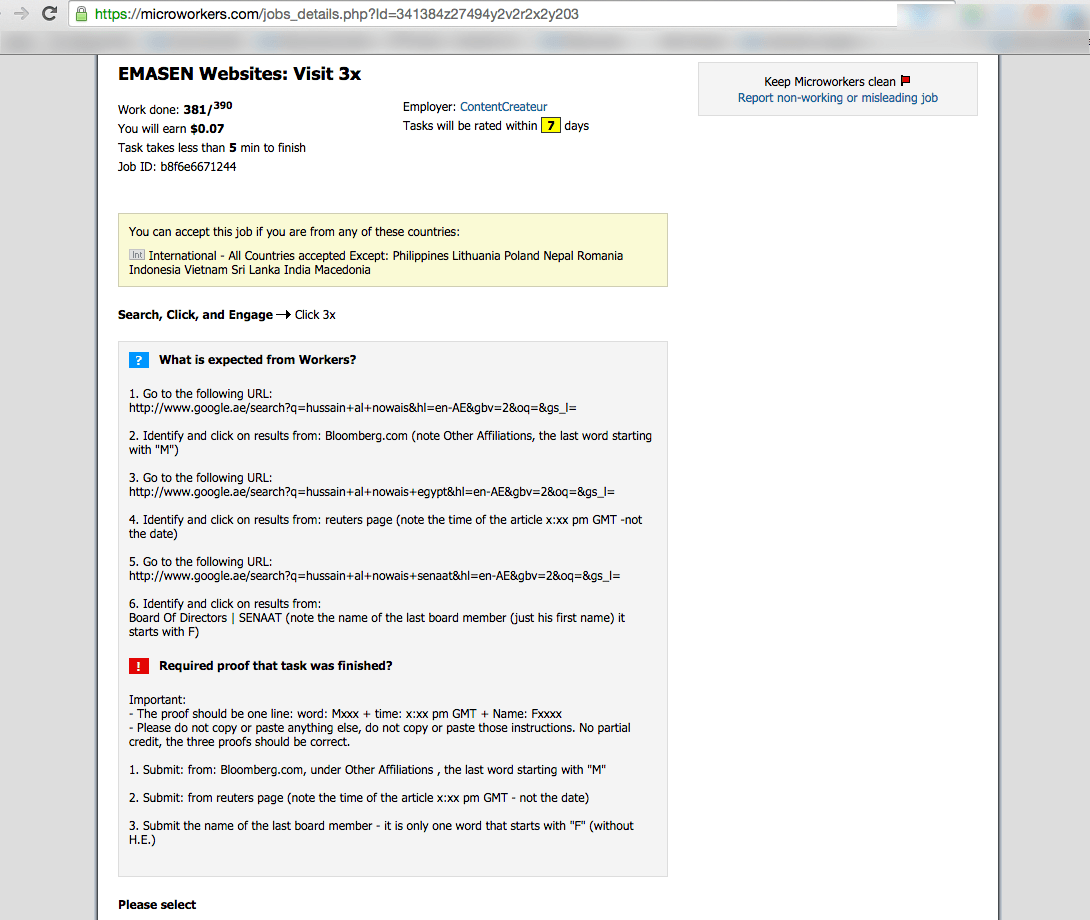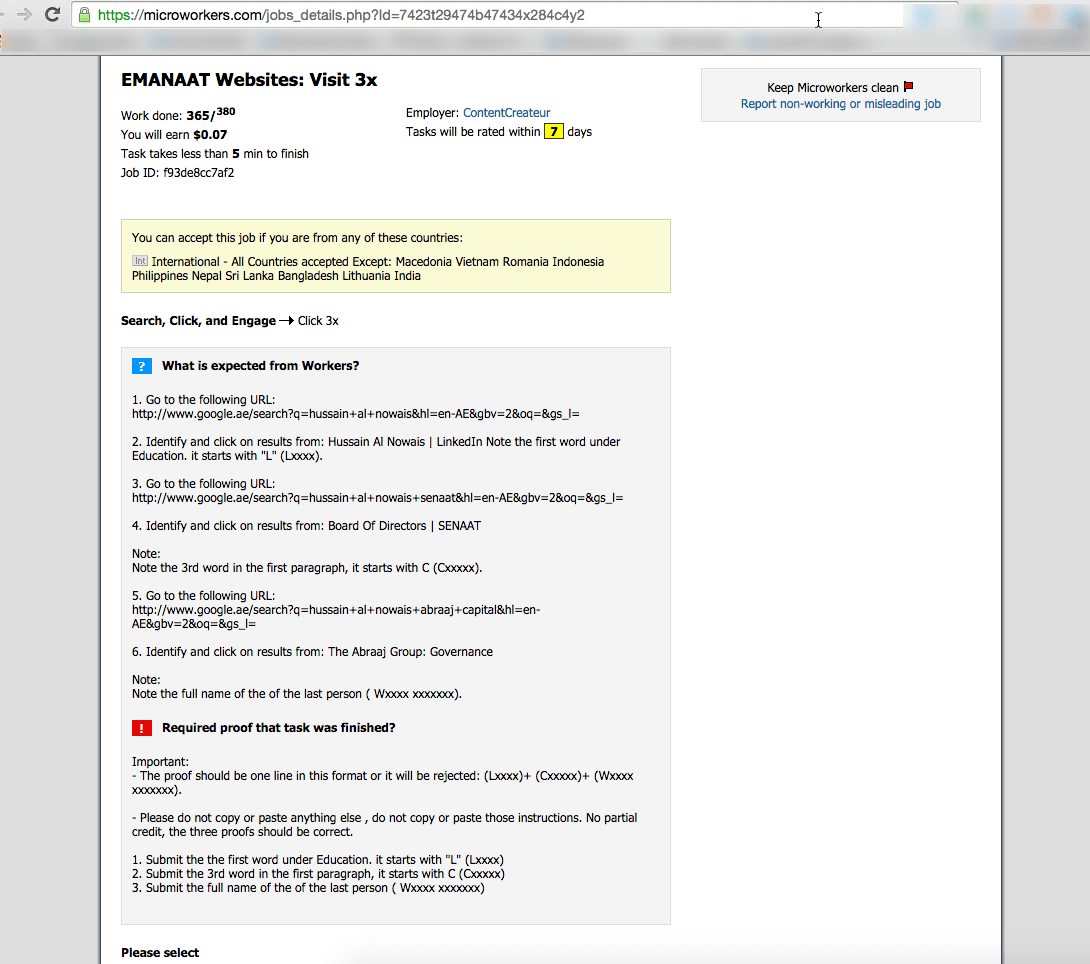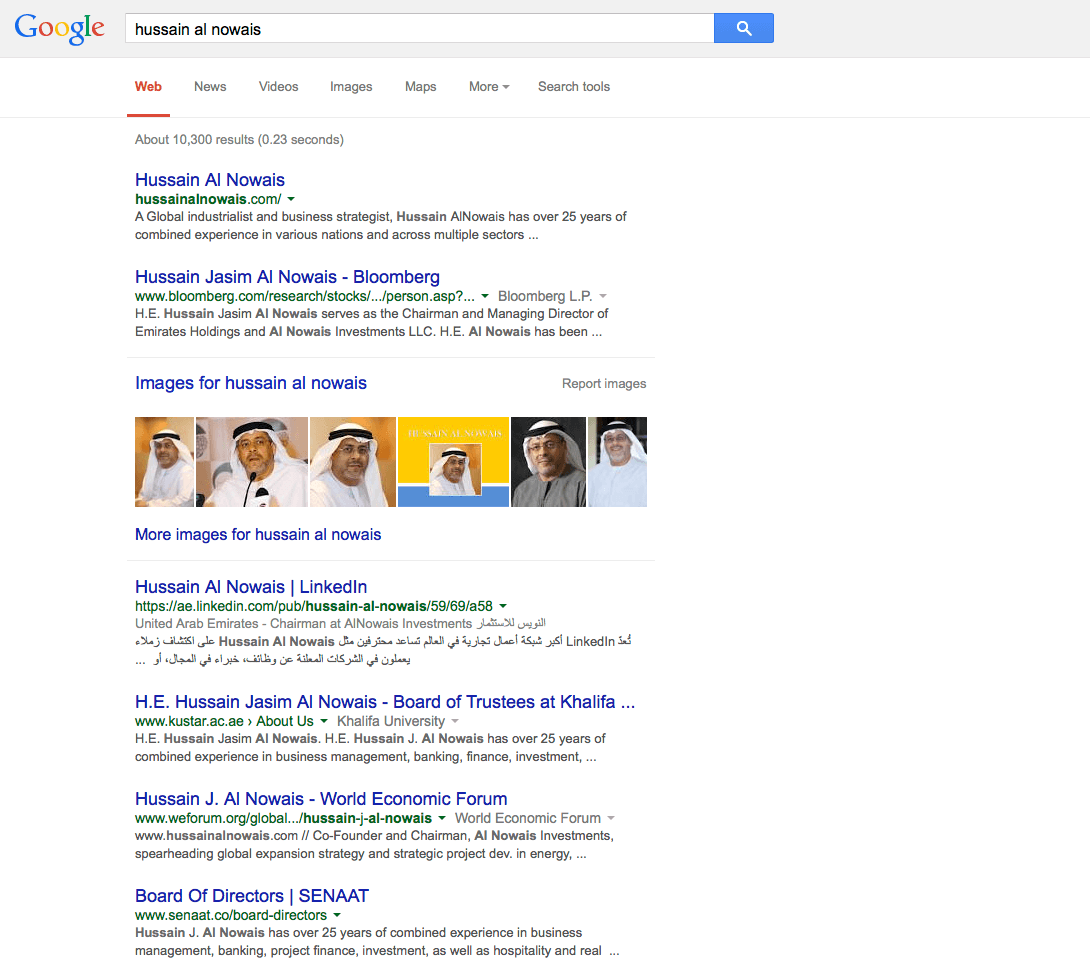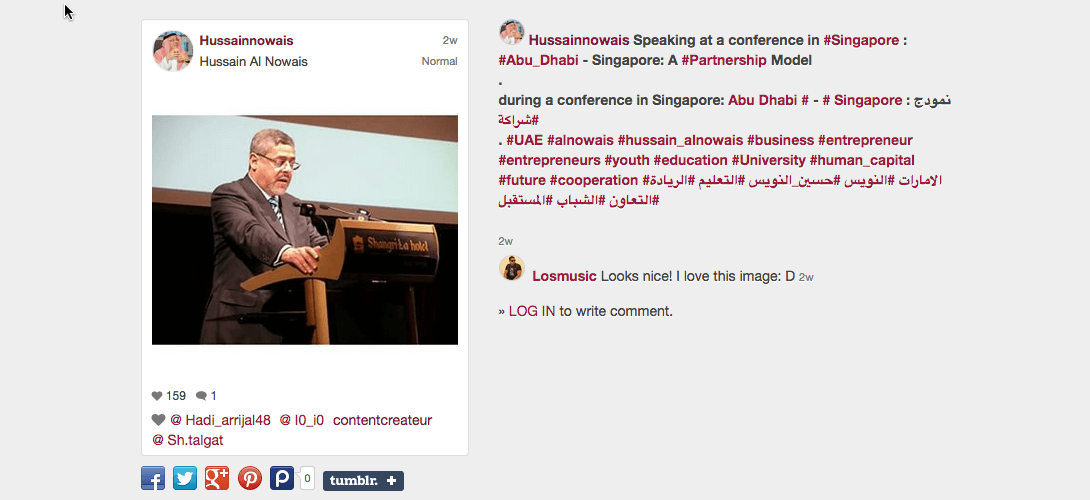Online Reputation Management With Crowdsourced Search SPAM
synopsis
In our previous articles, we discussed microworker search spam and the dangers for big brands when using blackhat search engine optimization (SEO) tactics. In this article, we examine how these techniques appear to be used for online reputation management in order to bury allegations of corruption and negative articles for prominent Emirati businessman Hussain Al-Nowais.
content
Changing search results without linking to or modifying website code
The challenge in online reputation management is that you don’t control the websites that are hosting negative content for your name. You can’t change the page content, site code, or any other aspect of the web property. These sites may be owned by prominent news agencies with strong sites that rank highly for your name-based search. Other sites that purport to be consumer ripoff protection sites also have strong search rankings. You cannot edit the site content, and the news agencies are protected by free speech in most countries.
Trying to remove the content directly from major search engines is a difficult process that involves having to take the offending sites to court and winning a judgement, forcing them remove the content. Only then will the search engines also suppress the search results.

What online reputation management companies could do in the past was flood the internet with alternative content, or try to engage large scale link spam to change the search results.
If you’re an individual with financial means, you could also hire a Public Relations (PR) firm to try and publish additional news content mentioning your name. That content, of course, would only rank if it was more popular than the original negative scandal — or if you tried to employ the same kind of link spamming mentioned above.
All these tactics have become very difficult because the major search engines are learning and adapting to link spam at an accelerated pace. As it turns out, even people with substantial financial capital no longer need to bother with link spamming and PR. There is a new search manipulation tactic in use that seems to work much better.
Real world case study of Emirati businessman Hussain Al-Nowais
Before examining the examples below, it’s of benefit to you to understand why this kind of crowdsourced search works.
Google uses user activity to reclassify search results. We know this is true because it was testified to by Google's former chief of search quality Udi Manber in a FTC.gov court case:
“The ranking itself is affected by the click data. If we discover that, for a particular query, hypothetically, 80 percent of people click on Result No.2 and only 10 percent click on Result No. 1, after a while we figure probably Result 2 is the one people want. So we'll switch it.”
To get a deeper understanding of the technique before going further, please read our article titled Web Search Manipulation Using Social Media and Microworkers.




Due diligence is important when hiring a reputation management company
It’s hard to imagine anyone putting forth financial capital to influence the search results unintentionally or as a hobby. The work requested above is more than likely a result of a reputation management company. The only thing that is not clear is if Mr. Al Nowais was aware of the kind of SPAM this company was using to change the search results for his name, and in his name.
Before you hire a reputation management firm, always do your due diligence and ask about the exact tactics that will be used in your name. If these kind of wholesale search manipulation is discovered, it can lead to a far worse reputation than anything being covered up.
The danger to the free market and democracy from this kind of blackhat reputation management SPAM
Ask anyone at Google, Yahoo, or Bing if this kind of search manipulation is possible and they will most likely deny it. The companies’ official stance appears to be that conducting searches with microworkers won’t really help the site. We’ve already proven that their official stance is not true, and that opens up a much larger and scarier door.
As citizens of a “free” and democratic society and consumers, we all rely on search results to conduct research, form opinions, and take action based on that activity. Because microworkers are cheap to employ and difficult to spot, any corporation, political party, or wealthy individual, can completely control the search results around any given topic.
The danger is not just that Microsoft will trick you into changing your opinion about the iPhone. The danger cuts down to the very fabric of democracy and free markets.
Microworkers do not have an allegiance to anything other than the payment for their clicks. This means that any outside government can control what you see and think about anything going on in your country, or theirs, by spending some cash.
If you thought that the June Fourth incident in Tiananmen Square was a major coverup, imagine what an army of workers from China could do with US based IP addresses hijacked by malware.
We sit comfortably in our western countries believing that what we see, and what we think, is protected by free speech, freedom of the press, and an independent market. We’re led to believe that search engines use sophisticated algorithms to bring us trusted content from the internet. Content that is not easily influenced by criminal organizations, politicians, or corporation.
The reality seems to be that what we find online is very easy to manipulate and censor.
This digital-gagging is even more powerful than communist-style censorship. In a dictatorship, you know that you’re being lied to. When you search Google, Bing or Yahoo, you have no such preconception.
The danger to the internet, and our society, is that this kind of underground manipulation is done in such a way that we never know we’re being lied to. It is the most insidious and subversive style of censorship.
Is this even legal?
In our article about Big Brands Darkside SEO Tactics we mention fair trade laws in Australia, Canada and the US. The United Arab Emirates seems to have Federal Law No (24) of 2006 which, according to their government website is meant to:
…prohibit unfair trade practices, curb unreasonable market manipulation, ban sale of sub-standard, fake, expired products and monitor pricing amongst other necessary measures to ensure consumer confidence and create an atmosphere of transparency in the market.
When will it stop
Even though there are laws on the books, prosecution is slow and the government is not the only answer.
As with all SPAM, it is motivated by financial gain. This kind of manipulation will only get worse until the financial incentive is removed. The only way it will stop is if the major search engines take up their fiduciary responsibility to protect their stockholders, and the public, by having results that are in THEIR control, not the spammers’ control.
Until such time as they end the effectiveness of microworker spam in their search results, spammers, SEO companies, marketing agencies, reputation management specialists, politicians, businesses and corporations, will all use this tactic for one simple reason: because it works.
author
:
Anthony Caldwell
Connect with Anthony on Twitter and LinkedIn. Learn more about Anthony on his profile page.
© 2026 Vital+Vectors by PepperVox PTY LTD
disclaimer
:The material on vitalvectors.com is produced by Vital+Vectors. It is intended to provide general information in summary form on relevant topics, current at the time of first publication. The contents do not constitute advice and should not be relied upon as such. Formal advice should be sought in particular matters.
The information and views set out in this article are those of the author(s) and do not necessarily reflect the official opinion of the PepperVox Pty Ltd trading as VitalVectors.com. Neither PepperVox Pty Ltd nor any person acting on their behalf may be held responsible for the use which may be made of the information contained therein.
Reproduction is authorized provided the source is acknowledged.